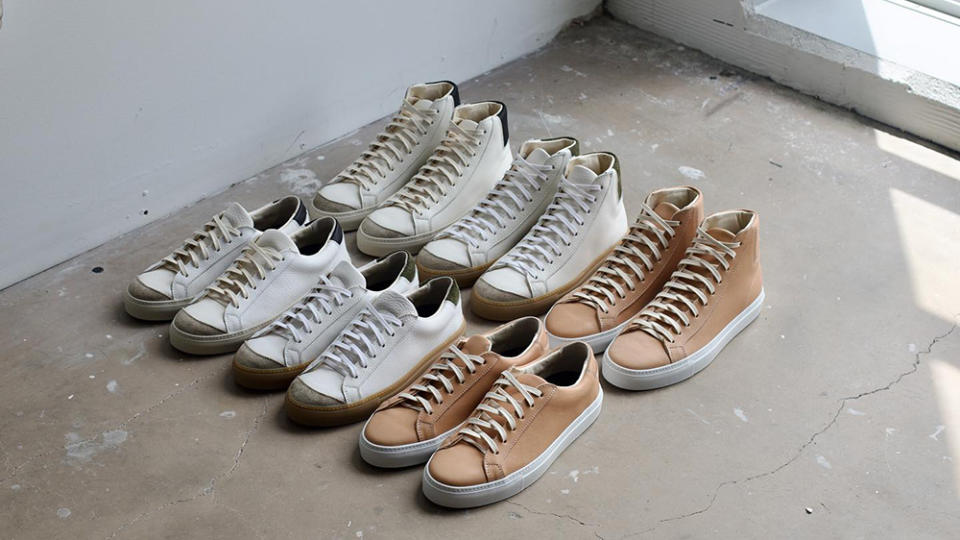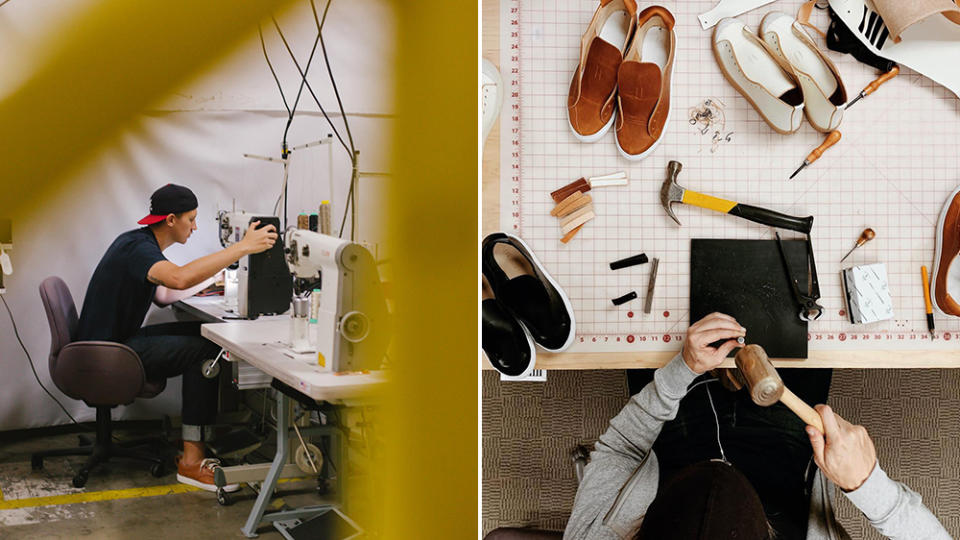How a North Carolina Sneaker Shop Is Designing Shoes to Last a Lifetime

For as long as he can remember, Justin James has wanted to design sneakers. As a child of the ‘90s, he obsessed over Air Jordans and received a new pair of sneakers every Christmas.
“They would sleep beside me on the pillow that night, because I was just so infatuated with the design and everything that went into a sneaker,” he tells Robb Report.
More from Robb Report
Made-to-Measure Menswear Brand Stoffa Launches Its First Footwear Collection
New Balance Claims Golden Goose Copied Its 990 Sneaker in a New Lawsuit
Drake Just Rocked Custom Pink Nikes on Stage. Here's How They Were Made.
So, when James landed an internship at a major sneaker manufacturer in 2013, it seemed as if his long-term dream of designing sneakers was about to be realized. Instead, it was shattered.
“When I saw mass manufacturing, it was like a lightbulb moment,” James recalls of the experience. “When I would walk into a shoe store as a kid, I loved these shoes. But I realized I was never given the story of how they were designed or how they were made. And that was a really significant piece that was missing.”
Dispirited by industry realities, James instead pursued a career in marketing. But once a sneakerhead, always a sneakerhead. He was soon shopping for shoemaking machines on Craigslist, watching YouTube tutorials, and tinkering in his garage.
“I told myself that if I’m not going to design shoes, I’m at least going to make shoes for myself,” James says.

In 2018, James’s DIY curiosity connected him with a Los Angeles business owner who was looking to sell off his shoemaking equipment. James later flew with his wife to Los Angeles, bought the machines, and suddenly found himself in the shoemaking business. He set up shop outside his hometown of Asheville, N.C., and launched Opie Way in November 2019.
The business—which James named by combining the pet names for his daughters, Ophelia and Wayland—is the antidote to everything he’d found wrong with modern sneaker manufacturing. Opie Way styles are made domestically from high quality, and when possible, local, materials, by the very same hands that designed them: James works on every shoe alongside his wife and their four employees.
In contrast to the flashy Nikes of his youth, James chose to strip the sneaker down to its most basic expression for his own design. The result of that distillation is the James, a classic court sneaker available as a low or high-top in materials including vegetable-tanned Italian leather or small runs of unique textiles such as selvedge denim and deadstock waterproof canvas. Laces and threading are sourced from North Carolina, while the rubber cup soles come from Italy.
“I found that I was a person who wanted to wear sneakers to weddings,” James says of his preference for pared-back design. “I wanted to wear sneakers every day, and you couldn’t really do that with a Jordan.”

The great majority of sneakers that are worn daily are soon consigned to the trash. But James is determined that Opie Way’s output—which is priced at $428 for a leather low-top, and $498 for a high-top—won’t see the landfill. The sneakers are constructed with a sidewall stitch, allowing them to be re-soled, a service that Opie Way performs at its factory.
Clients can choose between a single-time resole priced at $75, or a $145 “Lifetime” resole that provides fresh cup soles for, well, life. “I have some business mentors that tell me it’s significantly low-priced,” James says of the program. “For now, I’m pretty happy with that: let me prove to you that these are the best sneakers you’ve ever purchased.”
Opie Way’s sneakers, which require over 100 steps to manufacture using new and antique machinery, are sold online via a pre-order system that sees them ship in four to six weeks. As the factory team grows, James plans to introduce a stock program of styles that can be fulfilled immediately, and introduce new models including a deck sneaker and a slip-on. And while making all of these sneakers takes longer than mass-production methods, James sees the extra time and effort as worth it in the long run.
“My goal for my kids is to show them that you have the ability to do whatever you want to do,” James says. “And sometimes picking the hard thing to do is the right thing to do if you have the passion for it. “
Best of Robb Report
Sign up for Robb Report's Newsletter. For the latest news, follow us on Facebook, Twitter, and Instagram.

